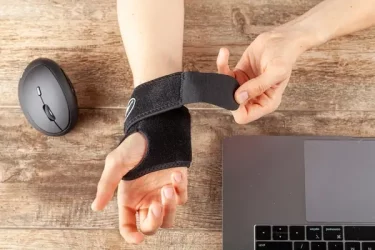If you’ve been struggling with the discomfort and limitations of carpal tunnel syndrome (CTS), rest assured: you’re not alone. Carpal tunnel syndrome is a common condition and it’s estimated it affects between 7-16% of UK adults. It occurs when the median nerve, which runs from your forearm into your hand, becomes compressed or squeezed at the wrist. This compression can lead to symptoms such as numbness, tingling, weakness, and pain in the affected hand and fingers.
For those whose symptoms are severe and persistent, carpal tunnel surgery might be recommended as a treatment option. Before you consider undergoing the procedure, it’s important to get a clear picture of carpal tunnel surgery success rates.

Carpal tunnel surgery: an overview
Carpal tunnel surgery (also known as carpal tunnel release surgery) aims to relieve the pressure on the median nerve. This is achieved by cutting the transverse carpal ligament that forms the roof of the carpal tunnel. The procedure can be performed through traditional open release surgery or minimally invasive endoscopic release surgery. However, the endoscopic release method is now being phased out.
The goal of carpal tunnel surgery is to alleviate symptoms and improve hand function. Success is typically measured by the reduction or elimination of symptoms and the restoration of hand strength and sensation.
Are most carpal tunnel surgeries successful?
The majority of CTS surgeries are successful in relieving the symptoms of carpal tunnel syndrome. Although figures differ according to the source, it’s generally accepted that the success rate of carpal tunnel surgery is over 90%.
Is there a downside to carpal tunnel surgery?
As with any surgery, there are potential risks. These include:
- infection
- damage to the median nerve
- injury to the blood vessels.
Risks related to the procedure include a dull pain around the surgical scar called ‘pillar pain” which usually resolves itself within months.
Following surgery, there is a 5-10% chance of carpal tunnel recurrence.
Understanding success rates – what makes surgery a success?
When evaluating the success rates of open and endoscopic carpal tunnel surgery, it’s important to note that individual outcomes can vary. Several factors influence success rates. These include:
- the severity of your condition
- your overall health
- the surgical technique used
- the skill of the surgeon.
The following are some factors that contribute to CTS surgery success rates:
Symptom relief
Carpal tunnel surgery is generally successful in relieving symptoms such as:
- numbness
- tingling
- pain.
Many patients experience a significant improvement in their quality of life and a return to normal hand function.
Patient satisfaction
Success also comes down to patient satisfaction. This not only applies to the clinical outcome of the surgery, but also for the level of care and service throughout the healthcare journey.
With that in mind, 99% of patients would recommend Practice Plus Group to others. Our top-quality consultants and surgeons provide first-class care from the moment you step through our doors.
“The expertise and professionalism shown by all the team in the operating theatre was most impressive and very reassuring. The nurse at my local surgery was most impressed and delighted with the quality of the stitches. My grandchildren thought I had a caterpillar in my hand! Many thanks to all concerned.
Geoff, carpal tunnel surgery patient, Practice Plus Group Hospital, Southampton
Success criteria
Clinical success is often measured based on the resolution of symptoms and improvements in hand strength and functionality. A successful surgery may be defined as a substantial reduction in pain and tingling, increased grip strength, and improved sensation in the affected hand.
Immediate v long-term success
While many patients experience immediate relief after carpal tunnel surgery, the long-term success of the procedure can also be a crucial consideration. Some studies suggest that a significant number of patients maintain symptom relief over the long term. Others (around 5-10% of patients) might experience a recurrence of symptoms years after surgery.
Factors influencing success rates
Several factors can influence the success rates of carpal tunnel surgery. These include:
Timing
Early intervention is generally associated with better outcomes. Addressing carpal tunnel syndrome before it becomes severe can increase the chances of relief from the symptoms.
Surgeon experience
The skill and experience of the surgeon performing the procedure play a significant role in the success of the surgery. Choosing a surgeon with expertise in carpal tunnel surgery can greatly improve your chances of a positive outcome.
Patient health
Your overall health and any underlying medical conditions can impact your body’s ability to heal and recover after carpal tunnel surgery. Conditions like diabetes and obesity might affect healing and recovery.
Rehabilitation
Following post-operative guidelines and engaging in rehabilitation exercises (as recommended by your healthcare provider) can contribute to a successful recovery.
Is carpal tunnel surgery worth the risk? Making an informed decision
Carpal tunnel release (CTR) is proven to be effective in providing relief to many UK patients suffering from carpal tunnel syndrome. If you’re considering carpal tunnel surgery as a treatment option, it’s important to have a thorough discussion with your healthcare provider. They can provide you with personalised information about your condition, along with the potential benefits and risks of surgery. They will also inform you of what you can expect in terms of success rates.
At Practice Plus Group, we always start with a pre-operative assessment. This is our opportunity to ensure that the procedure for which you have been referred is right for you. We’ll explain your treatment to you and make sure that you are healthy enough to proceed. The assessment is also your opportunity to meet the team who will care for you and to ask any questions you may have.
It’s important to remember that success rates are not guarantees; they’re statistical probabilities. Every patient’s experience is unique to them. By working closely with your healthcare team, you can make an informed decision that aligns with your health goals and expectations.
Your journey towards improved hand function and symptom relief starts with informed choices.
Learn more about the costs of private carpal tunnel surgery.






